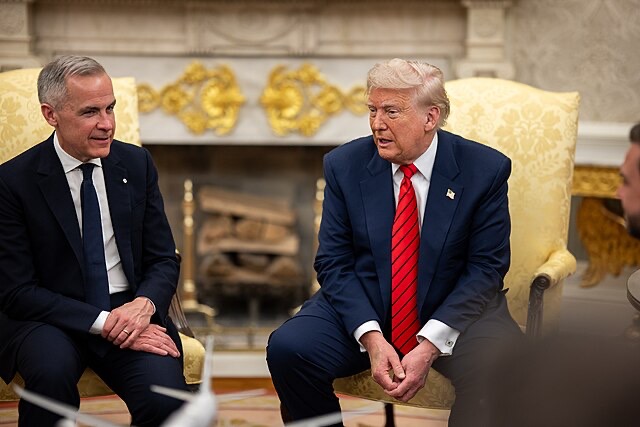A Diplomatic Debut Overshadowed by Dominance
What was supposed to be a moment of diplomatic decorum turned into a masterclass in political power play as U.S. President Donald Trump welcomed Canadian Prime Minister Mark Carney to the White House on May 6, 2025. It was Carney’s first official visit to Washington since taking office—and it was anything but smooth sailing.
According to renowned body language expert Judi James, the optics of the meeting told a much different story than the carefully scripted press briefings. While the two leaders smiled for the cameras, a deeper narrative played out in non-verbal cues, psychological tactics, and subtle power gestures that revealed just who was in control.
What Really Happened in the Oval Office?
From the moment Carney walked into the room, Trump began what James described as his typical “sledging”—a pre-emptive strike via aggressive online posts and veiled insults. Just hours before the meeting, Trump had tweeted criticism of Canadian trade practices and suggested Canada “might just fit in nicely as the 51st state.”
The comment may have been offhanded, but in diplomatic circles, it landed like a firebomb. While Carney publicly brushed off the taunt with a calm “Canada is not for sale,” insiders say the power dynamics had already been set in motion.
The Meeting at a Glance
Official Agenda vs. Unofficial Power Play
On paper, the Carney-Trump meeting was designed to bolster U.S.-Canada ties, with a focus on trade, energy cooperation, and continental security. But in practice, it became a stage for Trump’s dominance theatre—a now-familiar pattern where visiting leaders find themselves off-balance under Trump’s alpha presence.
Even the positioning in the Oval Office—Carney leaning forward, hands clasped, while Trump reclined confidently—sent a strong signal. This wasn’t just a bilateral meeting; it was a game of psychological chess.
Trump’s 51st State Joke That Wasn’t Funny
Trump’s comment that Canada “wouldn’t be such a bad 51st state” was intended to provoke, and it worked. Canadian officials immediately rebuked the suggestion, with Carney later remarking, “Canada is proud of its sovereignty and identity. We value partnership—not assimilation.”
While some dismissed the remark as Trumpian bluster, analysts argue it was part of a larger strategy to test the resolve of the new Canadian leader on his first major international outing.
Body Language Breakdown – The Trump Effect
The Handshake Heard Around the World
It started, as it so often does with Trump, with the handshake. Body language expert Judi James noted that Trump’s approach was classic power play: his hand came in at a downward angle, a move often used to assert dominance over the recipient. Carney responded with a more tentative grip, placing a hand on Trump’s lower arm—a move that could have countered the control, but instead appeared hesitant and half-hearted.
“Trump’s handshake was a territorial claim,” James explained. “His posture, his smirk, his pacing—everything screamed confidence and control. Carney, by contrast, looked like he was bracing himself for impact.”
Photos from the encounter show Carney attempting to replicate Trump’s now-famous “fist of power” pose for the cameras, but James described it as “a mimicry gone flat—more defense mechanism than statement of strength.”
“Meat Tenderizer Tactics”: Trump’s Pre-Game Psychology
Trump’s dominance didn’t begin at the White House doors—it started days earlier. In a string of posts on Truth Social and in press comments, he criticized Canadian steel exports, energy policy, and even mocked Carney’s “Bank of England past.” According to James, these tactics serve as a kind of “meat tenderizer”—softening the opposition with verbal jabs before they even arrive.
“It’s like a boxer taunting his opponent during the weigh-in,” James said. “By the time Carney stepped into the Oval Office, Trump had already framed the narrative.”
Carney’s Composure vs. Trump’s Alpha Energy
Grey Rocking the Taunts
While Carney didn’t match Trump’s aggression with bravado, that doesn’t mean he didn’t have a strategy. Several Canadian observers noted his use of the “grey rock technique”—a psychological method often used to defuse confrontations by appearing unengaged, neutral, and emotionally flat.
Rather than rise to the bait, Carney maintained a calm, almost passive demeanor. In contrast to Trump’s animated gesturing and sharp retorts, Carney spoke in measured tones, stuck to talking points, and avoided eye-rolling or visible frustration—signs that could’ve been exploited by Trump as weakness.
“It wasn’t about winning the alpha war,” said one Canadian diplomat. “It was about getting out with your dignity intact and your message delivered.”
A Prime Minister Under Pressure
Carney’s challenge was twofold: defend Canadian interests in front of a hostile U.S. president, while not appearing combative in front of the world. In this, he largely succeeded, according to many political analysts. But the optics—especially for those only viewing the body language—were not in his favor.
The image of Carney appearing smaller, quieter, and more cautious next to Trump’s larger-than-life presence may reinforce the perception that Canada is the junior partner in the relationship, regardless of reality.
Public and Political Reaction
Canadian Media Defends Carney
In Canada, the press largely came to Carney’s defense. Editorials in The Globe and Mail and Toronto Star praised his measured diplomacy and his refusal to entertain Trump’s provocations. “Calm beats chaos,” read one headline. His declaration that “Canada is not for sale” was widely applauded as a moment of quiet strength.
Opposition parties in Parliament also offered support, framing Carney’s visit as a tough but necessary step in asserting Canada’s independence.
U.S. Conservatives Applaud Trump’s Swagger
In contrast, American conservative media praised Trump’s approach, calling it a return to “America First” dominance. Right-wing pundits hailed the 51st state comment as “vintage Trump”—part troll, part test of leadership. Some went further, questioning whether Canada could benefit economically from deeper integration.
Yet many moderates and diplomats expressed concern that such tone risks further straining the relationship with America’s northern neighbor.



